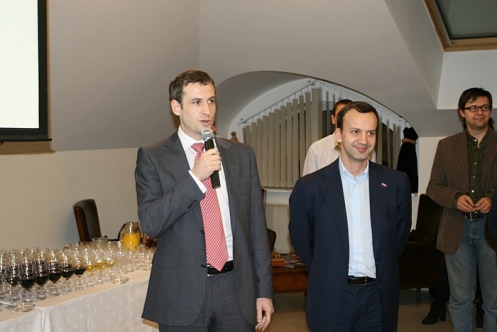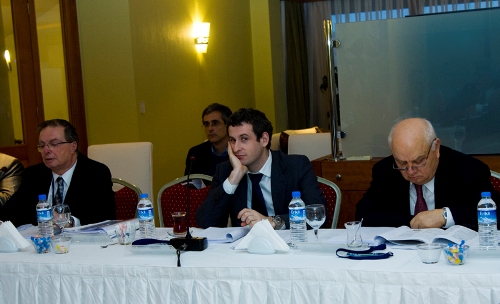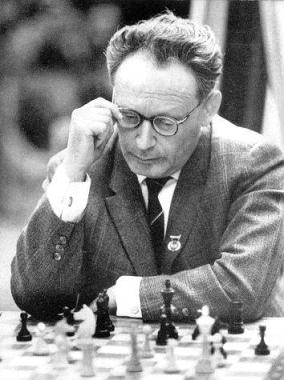In an interview published today, Ilya Levitov, a FIDE Vice President and the man in charge of the Russian Chess Federation, explains why he believes the plans to hold a World Championship match in London broke down, and also reveals details of the next World Championship cycle.
The news that London was withdrawing its bid to hold the World Championship match in the run-up to the 2012 Olympics came in a press release from Malcolm Pein, the CEO of Chess Promotions Ltd. He explained that despite a formal offer being lodged in July 2010 FIDE had failed to meet a deadline of January 29 to accept it.
FIDE responded with an open letter from Vice President Israel Gelfer, who claimed that, “the withdrawl of GM Carlsen from the WC cycle meant that the sponsor was no longer interested in sponsoring the match.”
In the following interview with Yury Vasiliev for Sport Express, Ilya Levitov supports Gelfer’s version of events, but also adds extra details and then goes on to talk about both what will happen now in 2012, and the next World Championship cycle. (Note: the first question is a little inaccurate – the deposit was in euros and negotiations were held, but no agreement was reached.)

Ilya Levitov speaking next to Arkady Dvorkovich at the opening of the 2010 Russian Championship | photo: chess-news.ru
On the eve of the FIDE Presidential Board meeting the organising committee of the World Championship match, which was planned for spring 2012 in London, announced that the English wouldn’t be running the match. They explained their decision was based on FIDE’s unwillingness to negotiate with them. They say that the FIDE functionaries didn’t respond to them even after they received financial guarantees in the form of a 50,000 dollar deposit. So what happened?
I think London’s refusal was directly linked to Magnus Carlsen refusing to take part in the World Championship cycle. The sponsor of the London match, a big chess fan and a wealthy man, expressed a great desire to hold the World Championship match. But after Carlsen dropped out my deep conviction, also based on the information available to me, is that the London organisers ceased to want to run such a match. It seems they considered a direct refusal to be undignified, and therefore they decided to put forward completely unrealistic conditions.
For example?
There were more than 35 conditions. At first they promised a prize fund of 2 million euros, and then 1.6 million euros. They wanted to burden FIDE with the cost of the players’ taxes and they didn’t want to put money towards the World Championship Development Commission. In case of one of the players refusing to play they wanted themselves, and not FIDE, to take the decision about the replacement. But there are points in the regulations which FIDE can’t simply bypass. Of course, I’m not saying that FIDE’s management is ideal. I wasn’t present at the negotiations…
And who conducted the negotiations with London?
The first FIDE Vice-President Georgios Makropoulos and FIDE Vice President Israel Gelfer. I don’t doubt for a second that they really wanted to hold the match in London, as I saw their great disappointment after the negotiations collapsed.
And what now? What’s going to happen to the World Championship match in 2012?
Now everything is somewhat in limbo. A new bidding process will be opened up. The location of the match will probably depend on who becomes the challenger for the world title. If Aronian gets through, then Armenia will probably want to hold the match. If it’s one of the Azerbaijan players, then they’ll want it. Bulgaria will want to hold the match if Topalov wins. If Kramnik or Grischuk win then we’ll think about creating more comfortable conditions for our own sportsman. I’m sure that when the challenger’s been decided it’ll be much easier to find both a place to hold the event, and a sponsor.
After Levitov gives a favourable account of the FIDE Presidential Board meeting, Vasiliev goes on to ask whether Levitov followed up on a suggestion of Arkady Dvorkovich’s about taking into account Magnus Carlsen’s opinion when deciding on the World Championship regulations. It’s worth pointing out that Carlsen’s opinion is strangely distorted here. In his open letter he talked about the privileges of the World Champion, not the losing player, and wanted a tournament to determine the champion, not the challenger.
It was about the privileges of the player who loses the World Championship match. In general Carlsen would like the challenger to be determined in a tournament and not in matches, which personally strikes me as wrong. A candidates tournament is less interesting than matches. If you recall San Luis in 2005, then Topalov there achieved an almost 100% result in the first half, which essentially guaranteed him victory, meaning the second half of the tournament was no longer interesting. Therefore I think the candidates matches system is correct. However, Carlsen also has a point: the loser of the World Championship match shouldn’t have exclusive privileges.
Did the Presidential Board take Carlsen’s opinion into account?
I voiced his opinion. They said: “We’ll think about it and then decide”. After all, it’s also wrong to change things continually. You have to decide once and for all on some sane system and then keep to it.
Will decisions on the next cycle be taken after the 2012 match?
No, before then. If by 1 March nowhere has been found to hold the four Grand Prix tournaments, then the cycle will be as follows: the candidates matches will consist of three players from the World Cup, three based on ratings, the nominee of the organising country and the player who lost the World Championship match.
What innovations can we expect in the Russian calendar?
This year we’re launching a series of rapid chess tournaments in Russia. We’ll call it the “Rapid Chess Grand-Prix”. It’ll be a competition for different levels of chess player. A three-day festival: two days of rapid chess, while the third day will be completely given over to the spectators: simultaneous displays, chess meetings, lectures, a general blitz tournament…
Holding major tournaments in the regions is difficult, both financially and from an organisational point of view. A three-day festival is much easier. We’ll help out with the prize fund, while local chess fans should play a part in the organisation. I’d like such festivals to run all-year-round, as on the tennis tour – so that each week average chess professionals can travel to one Russian city or other and earn something.
In September we’re marking Mikhail Moiseyevich Botvinnik’s 100th anniversary by holding a memorial event for the sixth World Champion. That’ll be a unique tournament, both in strength and format: two days of rapid chess and blitz, while on the third day the players will engage with the spectators, as in the stages of our “Grand-Prix”.
Who’ll take part in the Botvinnik Memorial?
For now we’ve agreed on the participation of three players: Anand, Kramnik and Aronian. I can’t say for definite who else will play yet. Perhaps Carlsen and Nakamura, or perhaps someone else.
Do you already know the dates of the Tal Memorial?
The Tal Memorial will take place from 15 to 26 November in Moscow. Right now we’re in the process of choosing where to hold it. The principle of deciding on the line-up will be unchanged: our three best players plus the leading Western chess players. The line-up definitely won’t be worse than in previous years.





For those of you who are willing to feast on the spiteful offal – the open letter ostensibly to Malcolm Pein – that FIDE has vomited up to what it perceives as its uniformly credulous public:
… Check The Dates …
Offers can be withdrawn at any time prior to acceptance. If London wanted out when Magnus withdrew, why do London and FIDE both acknowledge that an offer remained on the table for two months thereafter? All FIDE had to do was sign during that time and London would be contractually committed to a very large amount of money.
Perhaps recognizing the gaping hole in FIDE’s story, Levitov accuses London reflecting its non-interest by negotiating onerous terms. First, anyone here risking their own money in a deal with FIDE would negotiate every possible way to protect himself, far more than one would do when dealing with a reputable counterparty. Second, and more importantly, London did not need a pretext if it really was not interested. It could have instead simply withdrawn the offer immediately. Levitov posits that that would have been “undignified,” but walking away from FIDE is never undignified; indeed the risks to dignity cut very much in the opposite direction. Third, if London really no longer wanted to host the event and was carrying on the negotiations as a pretext, the absolute last thing it would do is give FIDE advance notice of a deadline in which to accept. Rather, it would suddenly and unexpectedly pull the rug out from under ongoing negotiations.
As usual, FIDE’s lies can’t be reconciled with the known facts.
At the end of the day, of course, it is never surprising when reputable interests in the West don’t come to terms with the sleazeballs and nutcases at FIDE. It is equally not surprising that FIDE will always tell the chess public that this situation is never FIDE’s fault. Capitalizing on the opportunity to bring the chess championship to London in the year of the Olympics was a very worthy goal for FIDE. It would have done chess a lot of good. The bottom line is that, having been afforded years to make it happen, FIDE failed and, as usual when it does so, it is pointing fingers. FIDE’s open letter and Levitov’s related comments are a transparent deflection tactic to draw attention away from its failure.
For me, the most stupid thing is this “host nominee”. For god’s sake, it’s not any other invitational, it’s the World Championship Candidates! you can’t simply choose by hand, “oh, that guy who barely stands at 2700 from my country is the nominee”…
Incidentally, note that our fine editor tells us in his typically sober and understated way that, with respect to Magnus’s critique of world championship regulations, “[i]t’s worth pointing out that Carlsen’s opinion is strangely distorted” by Levitov. And indeed, Levitov’s recital reflects no understanding of Magnus’s opinion whatsoever.
This make this subsequent exchange almost humorous:
Question: “Did the Presidential Board take Carlsen’s opinion into account?”
Levitov: “I voiced his opinion.”